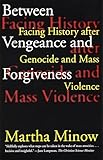Between vengeance and forgiveness facing history after genocide and mass violence
Material type: TextPublication details: Boston Beacon Press 1998Description: xiii,214p. 22 cmISBN:
TextPublication details: Boston Beacon Press 1998Description: xiii,214p. 22 cmISBN: - 9780807045077
- 303.6 22 MI-B
- HV6322.7 .M56 1998
 Print
Print
| Item type | Home library | Collection | Call number | Status | Notes | Date due | Barcode | |
|---|---|---|---|---|---|---|---|---|
 Print
Print
|
OPJGU Sonepat- Campus FOB Library | Special Collection - Stephen P Marks | 303.6 MI-B (Browse shelf(Opens below)) | Not For Loan | Gifted by Prof. Stephen P. Marks | 021494 | ||
 Print
Print
|
OPJGU Sonepat- Campus Main Library | General Books | 303.6 MI-B (Browse shelf(Opens below)) | Available | 120172 |
Browsing OPJGU Sonepat- Campus shelves, Collection: Special Collection - Stephen P Marks Close shelf browser (Hides shelf browser)

|
No cover image available |

|

|

|

|

|
||
| 302.54 FR-E The empowered self : law and society in the age of individualism / | 303.4833 HU-P Pole star human rights in the information society | 303.484092 LA-C The courage of strangers : coming of age with the human rights movement / | 303.6 MI-B Between vengeance and forgiveness facing history after genocide and mass violence | 303.6095475 GU- Gujarat : the making of a tragedy / | 303.609596 CH-V Voices from S-21 : terror and history in Pol Pot's secret prison / | 303.625 ST-U The ultimate terrorists / |
Includes bibliographical references (p. [148]-199) and index.
Foreword / Richard J. Goldstone -- Ch. 1. Introduction -- Ch. 2. Vengeance and Forgiveness -- Ch. 3. Trials -- Ch. 4. Truth Commissions -- Ch. 5. Reparations -- Ch. 6. Facing History.
With Between Vengeance and Forgiveness, Martha Minow, Harvard law professor and one of our most brilliant and humane legal minds, offers a landmark book on justice and healing after horrific violence. Remembering and forgetting, judging and forgiving, reconciling and avenging, grieving and educatingMinow shows us why each may be necessary, yet painfully inadequate, to individuals and societies living in the wake of past horrors.
She explores the rich and often troubling range of responses to massive, societal-level oppression. She writes of the legacy of war-crime prosecutions, beginning with the Nuremberg trials. She explores whether reparation - such as the monetary awards given to Japanese-Americans for internment during World War II, or art, such as Holocaust memorials - can be a basis for reconciliation after immeasurable personal and cultural loss.
Minow also writes with informed, searching prose of the extraordinary drama of truth commissions in Argentina, East Germany, and most notably South Africa, and in the process delves into the risks and requirements involved in hearing from victims, the dynamics of gender, and the value of even imperfect gestures in the midst of these riveting experiments in justice and healing.
There are no comments on this title.

